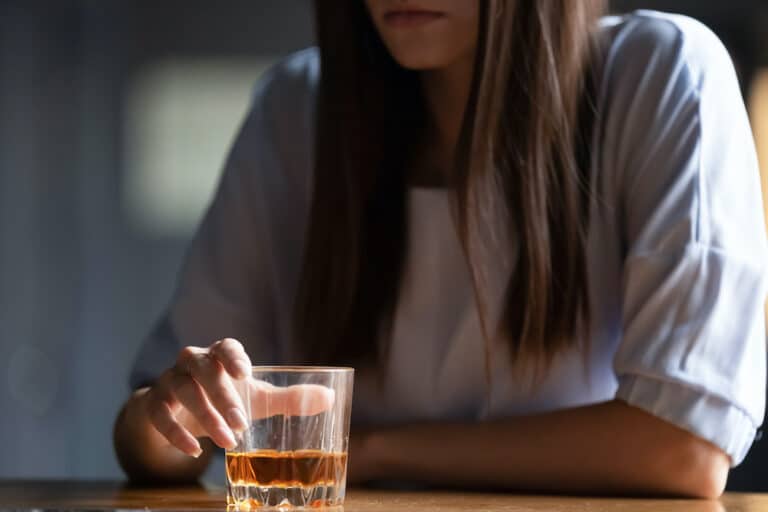How COVID-19 Has Impacted Alcohol Abuse
By Krystina Murray | 5 Sources

COVID-19 Induced Alcohol Abuse
The outbreak of COVID-19 has resulted in the death of many, declines in physical health, and changes in mental health. Since the onset of the COVID-19 pandemic, fear, anxiety, and depression have been on the rise. With people losing their jobs, adapting to public health retractions set in place to keep everyone safe, seeing reports of dying people on the news often, and worrying, it is no surprise mental health has been challenging. The connection between alcohol abuse and feelings of isolation, stress, and depression have always been linked.
Paid Advertising. We receive advertising fees from purchases through the BetterHelp links below.
Online Counseling for Alcohol Addiction
Online therapy can help you with long term addiction support. Start your therapy journey with BetterHelp.
- Personalized Matching Process
- Easy Online Scheduling
- 20,000+ Licensed Therapists
- Personalized Matching Process
- Easy Online Scheduling
- 20,000+ Licensed Therapists
Alcohol Use Numbers On The Rise
According to the National Institute on Alcohol Abuse and Alcoholism, Hurricane Katrina and 9/11 have encouraged increases in alcoholism, revealing the connection between high stressful situations and alcohol. With alcohol presently being a highly dangerous and highly abused drug, people may believe they have an excuse to drink in order to cope. Furthermore, being in quarantine during the onset of COVID-19 could have increased the percentage of those who drank alcohol.
Despite many businesses closing because of the COVID-19 pandemic, liquor stores were some of those that were allowed to remain open. It could be said that the availability of liquor stores and the ongoing stress of COVID-19 have increased drinking levels. In one case study, there was a reported 54% increase in alcohol sales nationwide during the first week of COVID-19 in March of 2020. Furthermore, online alcohol sales, “increased 262% when compared to the previous year.”

Need Addiction Support?
Reach out to a treatment provider today! Calls are always free and confidential.
Factors Contributing To COVID-19 Induced Alcohol Use
Stress and more time at home can be culprits to drinking. Having little to do at home and enforced restrictions of public places have created boredom and frustration, creating the temptation to drink. For others, the depression and anxiety surrounding job loss and increases of deaths due to COVID-19, as well as conflict at home and work have contributed to spikes in alcoholism. These numbers reveal the ideology that alcohol helps anxiousness or depression; however, many do not realize the more they drink, the more they risk the development of an alcohol use disorder. For example, some may be drinking every morning because they are at home and alcohol is readily available and they may not realize they are at risk of developing a tolerance. If left in isolation, those who drink are not held accountable and may overindulge.
A tolerance occurs when someone gets used to a certain amount of alcohol and needs more to feel a buzz. A shot or 2 of a distilled spirit that once caused a buzz may have a weaker effect. In turn, the individual may require more shots or a stronger spirit to feel something. In addition to developing tolerances to alcohol, drinking can impact the immune system by worsening chronic health issues. According to Yale Medicine, constant drinking can erode the intestinal lining, “causing bacteria to enter the body.” Inflammation can occur, and make someone more vulnerable to infection.
Lastly, if someone is abusing medications and decides to indulge in drinking regularly, he or she can cause certain medications to not work properly or increase the risk of overdose depending on the drug used. Fortunately, finding ways to manage stress like reading, exercise, connecting with loved ones, and meditation can serve as healthy coping mechanisms.
Risk Factors For COVID-19 Induced Alcoholism
Individuals are most at risk of alcohol abuse if they:
- Have a history of substance abuse.
- Drink alcohol regularly.
- Have an alcohol dependence.
- Have depression or other mental health conditions.
- Are sensitive to stressful times and circumstances.
- Are an essential worker.
Drinking too much alcohol can change the function in the brain, altering the chemistry. Alas, someone who drinks too much can experience alcohol withdrawal and have difficulty cutting back or stopping without experiencing extremely difficult side effects. Side effects of withdrawal such as anxiety, depression, nausea, and sweating can make everyday life difficult; many will continue drinking to feel normal. Offering support to loved ones and family members and observing problematic drinking such as four or more drinks for women and five or more for men within two hours (binge drinking) may encourage healthy conversations about drinking. If you or a loved one has indulged in frequent drinking, or has increased their alcohol intake, consider contacting a treatment provider risk-free to discuss treatment options.
